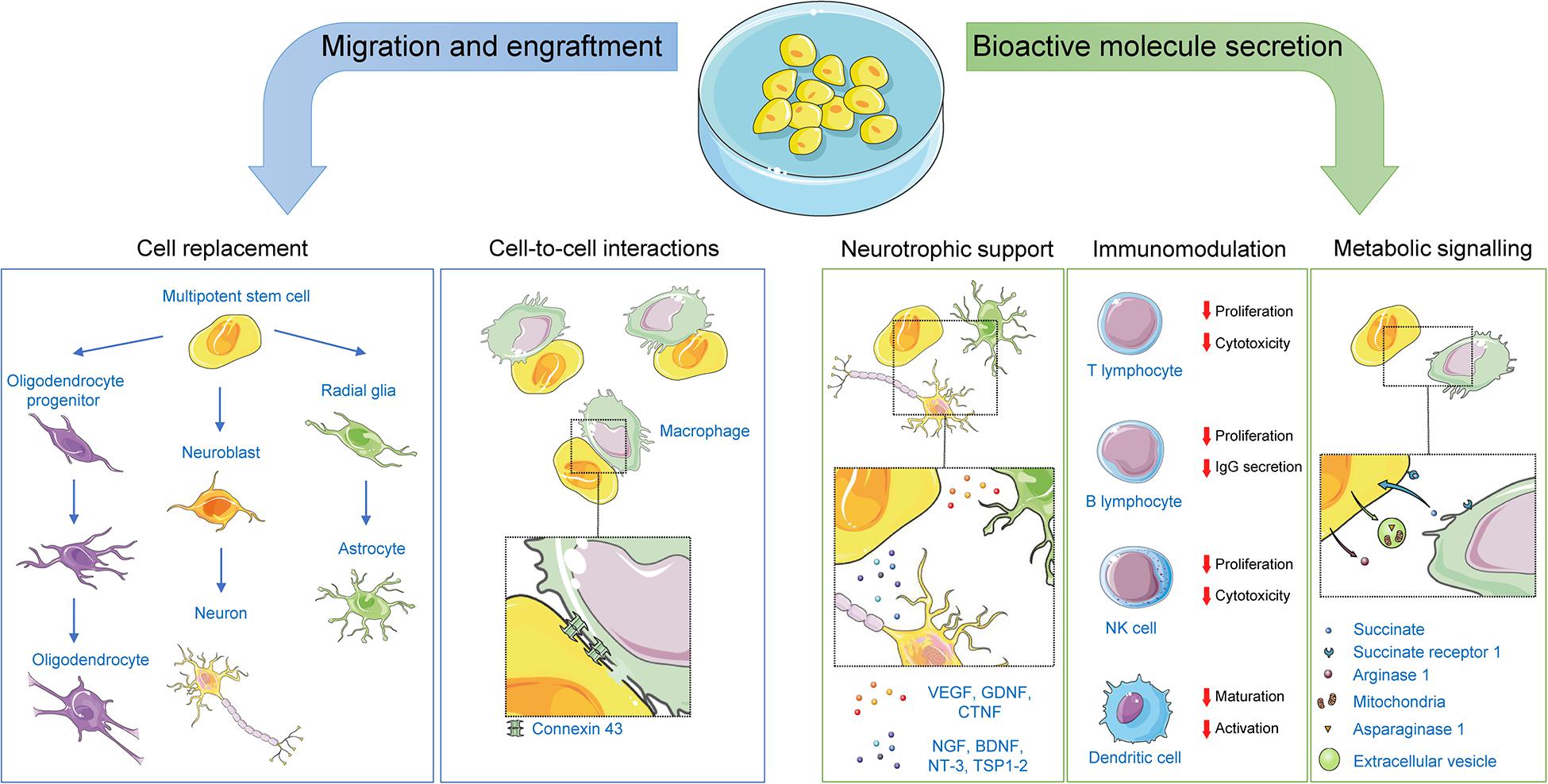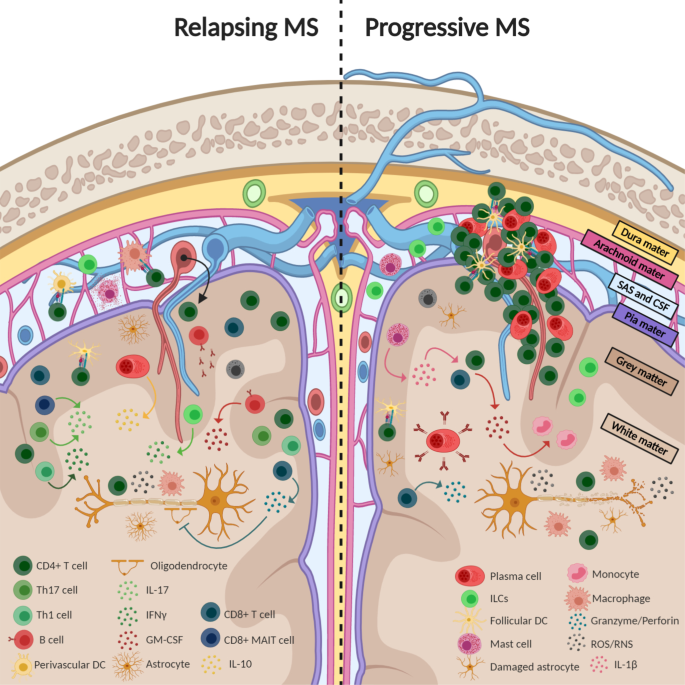9 Easy Facts About Regenerative Medicine For Multiple Sclerosis Shown
Wiki Article
3 Easy Facts About Regenerative Medicine For Multiple Sclerosis Explained
Table of ContentsThe Basic Principles Of Regenerative Medicine For Multiple Sclerosis An Unbiased View of Regenerative Medicine For Multiple SclerosisOur Regenerative Medicine For Multiple Sclerosis PDFsIndicators on Regenerative Medicine For Multiple Sclerosis You Need To KnowSome Of Regenerative Medicine For Multiple SclerosisExamine This Report about Regenerative Medicine For Multiple SclerosisRegenerative Medicine For Multiple Sclerosis - Truths
The mesenchymal stem cells transplanted throughout stem cell therapy can separate and grow to develop brand-new cells that can replace the harmed cells of the worried tissue. This might bring back neurological features in patients with this condition. These benefits of stem cell treatment are further sustained by the capacity of MSCs to advertise recovery.Patients with multiple sclerosis are normally treated with mesenchymal stem cells. These are multipotent stem cells that have the ability to separate and mature to develop a variety of cell types in the body. Once transplanted, these stem cells can develop to develop healthy nerve cells thus sustaining the regrowth of the broken cells of the anxious system.
As soon as hair transplanted, the stem cells move to locations of inflammation or damage within the main worried system (CNS). They are normally attracted to the sites of injury where the immune system is assaulting the myelin sheath, the safety treatment of nerve fibers. The stem cells work by advertising the repair work and regrowth of damaged myelin, possibly recovering feature to impacted nerve cells.
Regenerative Medicine For Multiple Sclerosis Things To Know Before You Buy
Stem Cell Research Study on MS The National Several Sclerosis Society, together with other organizations, is actively funding and supporting study right into mesenchymal stem cell therapy for numerous sclerosis to discover their prospective and improve treatment procedures. The objective is to develop more secure and much more reliable methods to use stem cells in dealing with MS.
Right here are evaluations from individuals of the Swiss Medica clinic. The patient traveled from England looking for relief from his MS signs, a condition he has actually fought given that 2006. Throughout the years, he has had problem with tiredness, mobility issues, and problems with his bladder and bowel, all coming from nerve damages.
His treatment experience was smooth. He additionally valued that his travel, lodgings, and vegetarian nutritional choices were thoughtfully arranged. "The medical personnel were outstanding, particularly the medical professional. Every little thing was clearly clarified, and they were extensive in their checks. I would absolutely suggest this location." The individual traveled from Romania looking for treatment for MS after listening to favorable responses about stem cell therapy for the illness.
Obtain a cost-free online appointment to discover just how stem cells will work for your situation, and what are the period and expense of the therapy. Uccelli, A., Laroni, A., Brundin, L., Clanet, M., Fernandez, O., Nabavi, S. M. Regenerative Medicine for Multiple Sclerosis., Muraro, P. A., Oliveri, R. S., Radue, E. W., Sellner, J., Soelberg Sorensen, P., Sormani, M. P., Wuerfel, J. T., Battaglia, M
Stem cells are cells in the body that can mature into develop cells that serve an offer functionCertain There are two primary kinds of stem cells: beginning stem cells and grown-up stem cells.
are found in some adult tissues and organs including the bone marrow, skin, blood, and mind. Grown-up stem cells are not as adaptable as embryonic stem cells and are as a result more restricted in terms of the sorts of cells they develop right into. The one-of-a-kind buildings of stem cells supply assurance for brand-new therapies that can slow/halt MS disease task and repair cells damages in the main nerve system.
Top Guidelines Of Regenerative Medicine For Multiple Sclerosis

The treatment involves collecting stem cells from a person's very own he said (autologous) bone marrow. The individual is after that treated with radiation treatment to deplete the immune system and stem cells are reestablished into the body where they mature right into brand-new, healthy immune cells - Regenerative Medicine for Multiple Sclerosis. Stem cells can be infused right into the body in various ways

In 2000, the MS Culture of Canada and MS Scientific Research study Structure funded a professional test including HSC transplants, led by Drs. Mark Freedman and Harry Atkins from the Ottawa Hospital Study Institute/University of Ottawa. The aHSC treatment offered in Canada is a therapy that utilizes high-dose chemotherapy, likewise called conditioning.

What Does Regenerative Medicine For Multiple Sclerosis Do?
Neural stem cells (NSC) are located in the mind and can grow into numerous kinds of brain cells including neurons, oligodendrocytes, and astrocytes. NSCs might serve to fix or shield the brain and modulate the body immune system. Early professional trials in non-human primates showed that therapy with NSCs benefitted the progression of MS-like illness in animal versions.The outcomes from these security researches are positive for future stem cell and regenerative medicine therapies in MS. Future medical tests (stage 2 and 3) with larger numbers of individuals and controls are needed to examine the efficiency of this therapy for MS. As shown by the examples over, there is a large range of research happening that will certainly offer extra responses regarding making use of stem cells to deal with MS.
Stem cell therapy is taken into consideration secure, however, like any kind of clinical procedure, it carries some threats, such as short-term swelling or discomfort at the injection website. However, severe negative effects are unusual when performed by qualified professionals.
What Does Regenerative Medicine For Multiple Sclerosis Mean?
Multiple sclerosis (MS) is a chronic disease of the central nerves that influences the brain and back cable. It is identified by the deterioration of myelin, a material that covers nerve fibers, causing disturbances in communication between the brain and the remainder of the body. Symptoms can vary extensively and consist of muscle mass weakness, vision problems, imbalance, and exhaustion.Several sclerosis is defined by the immune system incorrectly attacking the protective sheath (myelin) that covers nerve fibers, triggering communication problems between the brain et cetera of the body. The condition can bring about the damage or irreversible damages of nerves. Signs vary extensively among individuals and can include fatigue, flexibility problems, pain, and cognitive changes.
Report this wiki page